What was your initial response when you were approached to appear in this documentary?
Dr. Robinson: I said absolutely not. We were not interested in doing any movies or press of any sort. It’s not about us; it’s about the patients.


What was your initial response when you were approached to appear in this documentary?
Dr. Robinson: I said absolutely not. We were not interested in doing any movies or press of any sort. It’s not about us; it’s about the patients.

The different reactions of each character to a horrible situation seem remarkably realistic: No one knows quite what to do, but they all feel they have to do something.
Jackman: One thing I think Denis is really drawn to is the moral ambiguity – the gray areas – of characters and life. And I think that’s what really attracted us both to this material.

Your character experiences some of the darkest things a person can experience. During your preparation and filming, was there anything in particular that helped you connect with him?
Ejiofor: I think I wanted to find out about who he was. I thought there was something about him that was too remarkable.

Let’s start by talking about the unique backstory to making this film.
Salerno: I grew up in a house where Salinger was a church. My mom was a huge fan and turned me onto his work, but like everyone, I had no idea about the man, I just knew the work. I started researching this project and found out that J.D. Salinger landed on D-Day, that Salinger participated in these horrible battles, that he lost the love of his life, Oona O’Neill, to Charlie Chaplin.

When did Ip Man first come into your life?
Kar Wai: In 1998, I had a chance to meet with the family of the Grandmaster Ip Man. And they showed me a short film of him – which you can find on YouTube now. His son recorded it just a few days before Ip Man passed away. And you can see that it’s almost like a home movie; he’s very sick and quite thin.